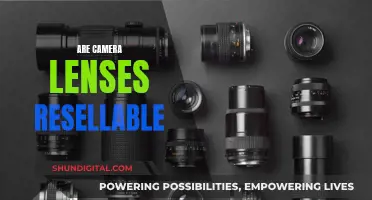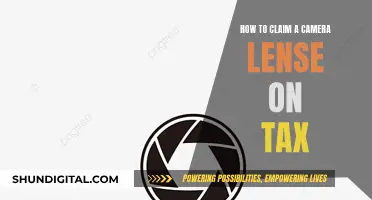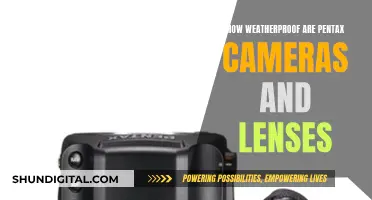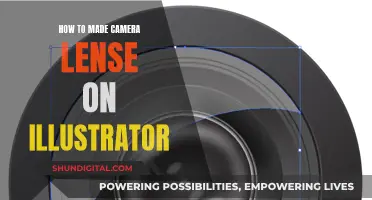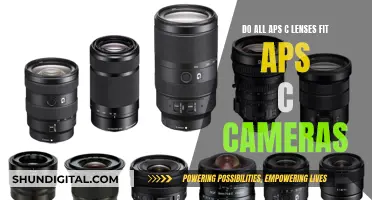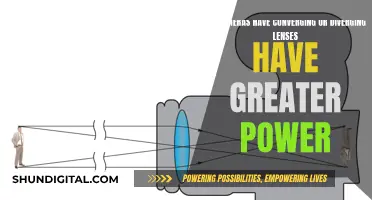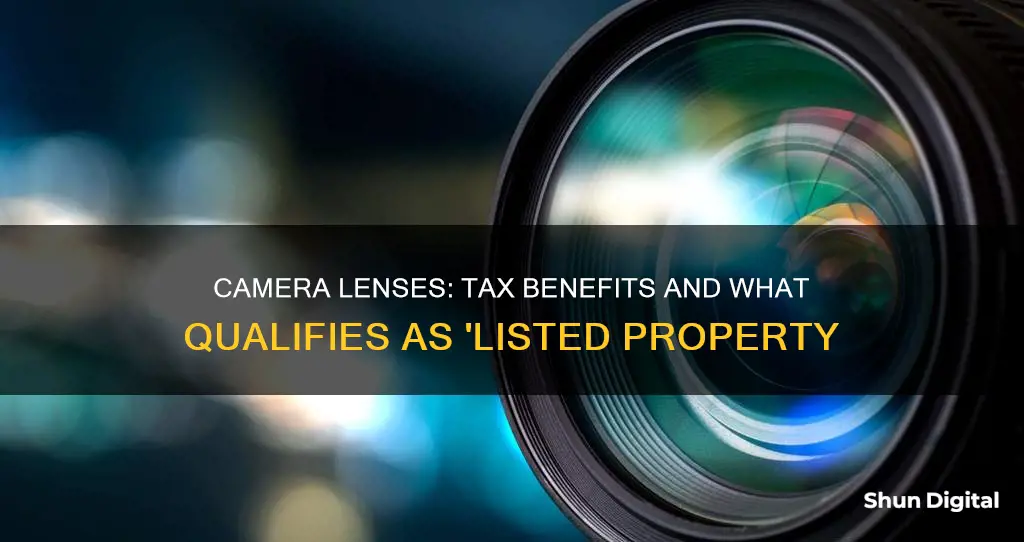
Camera equipment is a significant investment for photographers, and the good news is that these costs can be tax-deductible. However, it's important to understand how these deductions work to ensure compliance with tax laws and optimize your tax returns. In this paragraph, we will explore the topic of whether camera lenses are considered listed property for tax purposes and provide insights into the tax implications for photographers.
Photographers often invest in a range of equipment, including cameras, lenses, lighting, tripods, computers, and software. These purchases are typically considered capital expenses, and understanding how to treat them for tax purposes is crucial. While cameras and lenses are essential tools for photographers, they fall under a special tax category known as listed property. This classification is due to the potential for taxpayers to claim business deductions for items also used for personal reasons. As a result, photographers must carefully document the business use of their camera lenses and other listed property items.
The requirement to document business use ensures that taxpayers only claim legitimate deductions for camera lenses and other equipment used predominantly for work-related purposes. This documentation can be in the form of a logbook or similar record, detailing when and how the property is used. By satisfying this requirement, photographers can confidently include these expenses in their tax returns without raising red flags with the IRS.
When it comes to deducting the cost of camera lenses and other photography equipment, there are a few options. One approach is to deduct the cost gradually through depreciation, spreading the expense over multiple years. Alternatively, photographers can take advantage of the Section 179 deduction, which allows for the entire cost to be deducted in a single year, provided the property is used more than 50% of the time for business purposes. This deduction is subject to an annual limit, currently set at $1,000,000. It's important to note that if the business use of the asset falls below 50%, the Section 179 deduction must be recaptured, resulting in additional tax implications.
In summary, camera lenses are considered listed property by the IRS due to the potential for personal use. Photographers can still claim tax deductions for these expenses but must provide documentation to support their business usage. By understanding and adhering to these guidelines, photographers can maximize their tax benefits while remaining compliant with tax regulations.
| Characteristics | Values |
|---|---|
| Depreciation life | 5 years |
| Depreciation method | Section 179 deduction or depreciation over time |
| Depreciation amount | $200 per year |
What You'll Learn

Camera lenses are considered fixed assets for tax purposes
The Section 179 deduction allows you to deduct the upfront costs of the camera lens all at once, giving you a significant tax break in the first year. This can be particularly advantageous if you are looking to reduce your tax liability in a specific year. However, if the business use of the camera lens ever falls below 50%, the deduction must be recaptured, meaning you will need to pick it up as income.
Alternatively, you can depreciate the camera lens over time, typically over a period of 5 years. This allows you to spread out the tax benefits of the purchase over multiple years, rather than taking the entire deduction in the first year. This may be a more suitable option if you are looking for consistent tax breaks over a longer period of time.
It is important to note that camera lenses are considered listed property and are subject to limits on the amount of depreciation allowed per year, as well as a business use test. This means that you must use the camera lens for business purposes for a certain percentage of the time to qualify for the full depreciation deduction.
Overall, understanding the tax treatment of camera lenses as fixed assets can help you make informed decisions about your purchases and maximize your tax benefits.
Camera Lenses: Are Their Filters Universal?
You may want to see also

Lenses are depreciated over time, not deducted immediately
Camera lenses, like all camera equipment, depreciate over time. This means that their value gradually decreases over their lifespan. This is important for photographers to keep in mind, especially those running a photography business, as it affects their accounting and taxes.
For tax purposes, camera lenses are considered "listed property" and have a depreciation life of 5 years. This means that photographers can deduct a portion of the cost of the lens over its useful life each year, receiving a small tax break annually. Alternatively, if eligible, they can deduct the upfront costs all at once using the Section 179 deduction and get a more significant tax break in the first year.
There are different methods to calculate depreciation, but the most common one is straight-line depreciation. This involves determining the cost of the lens, subtracting the salvage value from the initial cost, figuring out its lifespan, and then dividing the asset value by the expected years of use. This results in the amount by which the asset will depreciate each year.
It's worth noting that depreciation is not the same as a deduction. Depreciation is a method of accounting for the loss in value of an asset over time, while a deduction is a reduction in taxable income. In the context of camera lenses, depreciation helps photographers determine the value of their equipment over time, and this information can then be used to claim tax deductions.
Photographers should also be aware of other tax deductions related to their equipment. For example, if a lens is rented for a specific project, the rental fee may be deductible. Additionally, certain insurance costs related to camera equipment may also be deductible.
Overall, understanding depreciation and the associated tax implications is crucial for photographers to maximize their tax savings and make informed decisions about their equipment purchases and upgrades.
How Camera Lenses Use Refraction to Capture Images
You may want to see also

Lenses are subject to limits on depreciation per year
Camera lenses, along with other photography equipment, are considered fixed assets for tax purposes. This means that, unlike expenses, where the full amount is deducted immediately from your taxable income, fixed assets are depreciated over time.
There are several methods to depreciate assets. One of the most common methods is straight-line depreciation, which involves dividing the asset's value by its expected lifespan. Other methods include depreciation by item usage and double declining depreciation.
When depreciating camera lenses, it's important to note that they are subject to limits on the amount of depreciation allowed per year. This is because they are considered "listed property" by the IRS. Additionally, to depreciate an asset, you must own it and use it in your business, determine its useful lifespan, and ensure it will be used for longer than a year.
While depreciation rules are set by the IRS, they may not always reflect the true market value of used gear. It's important to consult with a tax professional or accountant to ensure you are following the correct depreciation methods and rules.
Analog Camera Lenses: Interchangeable or Not?
You may want to see also

Lenses must pass a business use test to qualify for deductions
Lenses and other photography equipment can be considered "listed property" for tax purposes. This means that they can be depreciated over a period of five years for tax deduction purposes. This is particularly relevant for self-employed photographers, who can deduct business expenses from their taxes.
To qualify for deductions, lenses must be used for business purposes. This means that if you are claiming a lens as a business expense, you must prove that you have generated enough revenue to justify the expense. In other words, if you earned $1,000 last year, you likely won't be able to claim a $1,500 lens as a business expense. Additionally, the equipment must be used for more than one year to be considered a capital expense.
If you are claiming a lens as a business expense, it is important to keep detailed records of your purchases and expenses. This will make it easier to claim the correct amount and prove how much you spent and earned. When in doubt, consult a tax professional or CPA for guidance on which deductions to include and how to do so legally.
Camera Lenses: Radioactive or Not?
You may want to see also

Lenses used for personal reasons are not deductible
It is important to note that the rules regarding tax deductions for camera equipment can be complex and may vary depending on your location. It is always a good idea to consult with a tax professional or accountant to get specific advice for your situation. They can help you understand the applicable tax laws and ensure that you are claiming deductions correctly and in compliance with the relevant regulations.
Additionally, when it comes to tax deductions for camera lenses, it is crucial to keep accurate records and receipts. This is because the IRS or other tax authorities may request documentation to support your claimed deductions. Proper record-keeping can help you avoid penalties or audits in the event of a tax inquiry.
Furthermore, when determining whether a camera lens qualifies for a tax deduction, it is important to consider the proportion of business and personal use. If a lens is used for both business and personal purposes, only the business-related portion of the cost may be deductible. This allocation of usage can be complex, and it is another area where a tax professional can provide valuable guidance.
In summary, while camera lenses can be depreciated and deducted from taxable income over a period of years, this deduction typically applies to lenses used for business or income-generating activities. Lenses used solely for personal reasons are generally not eligible for tax deductions. Consulting with a tax expert can help you navigate the specific rules and regulations applicable to your situation.
Camera Lenses: Expensive, Fragile, and Worthy of Insurance Coverage
You may want to see also
Frequently asked questions
'Listed property' is a special tax category that includes items the IRS fears taxpayers might use for personal reasons but claim business deductions for. Camera equipment falls within this category. This means that if you use your camera equipment for both business and personal use, you may only deduct the business use percentage.
Calculate the business use percentage of your camera equipment by keeping a logbook or similar record showing when and how the property is used.
Some common mistakes to avoid when deducting the cost of your camera equipment include not having a reliable system in place throughout the year, not saving paperwork and receipts, and waiting until the last minute.
In addition to camera equipment, photographers can deduct a variety of other expenses, including subcontractor and second shooter labour costs, insurance, rental equipment and space, training and education costs, travel expenses, and interest on business credit cards, loans, and other forms of financing.


